
Guests
- Marq Lewisfounder and a community organizer for We the People Oklahoma, a Tulsa-based grassroots organization.
We go to Tulsa, Oklahoma, where the community is reeling over video footage showing a white police officer shooting and killing 40-year-old African American Terence Crutcher while his hands were in the air. “They released the footage Monday, and this is day six. We’re at a standstill. No arrests,” says Marq Lewis, founder and a community organizer for We the People Oklahoma, a Tulsa-based grassroots organization that has joined calls for the arrest of police officer Betty Shelby, who fatally shot Crutcher. The Justice Department says it’s investigating the shooting as a possible civil rights violation.
Transcript
NERMEEN SHAIKH: We turn now to Tulsa, Oklahoma, where the community is reeling over video footage showing a white police officer shooting and killing 40-year-old African American Terence Crutcher while his hands were in the air. Officer Betty Shelby shot Crutcher around 8:00 p.m. on Friday after his car broke down. Some of the video released Monday came from police helicopter footage, in which the man in the helicopter can be heard saying, quote, “That looks like a bad dude, too,” unquote. This is a clip from the police footage.
POLICE OFFICER 1: This guy is still walking and following commands.
POLICE OFFICER 2: Time for Taser, I think.
POLICE OFFICER 1: That’s—got a feeling that’s about to happen.
POLICE OFFICER 2: That looks like a bad dude, too. Could be on something.
POLICE OFFICER 3: Which way are they facing?
POLICE OFFICER 1: Police 1, they’re facing westbound. I think he may have just been tasered.
POLICE OFFICER 4: Shots fired!
POLICE OFFICER 3: Adam 3-21, we have shots fired. We have one suspect down. We need EMSA here.
POLICE OFFICER 2: They need to—they need to get this eastbound closed down, if they could, because they’re not going to be able to let anybody—
POLICE OFFICER 1: OK.
NERMEEN SHAIKH: That was police helicopter footage. Other footage from a police dash cam vehicle shows Crutcher walking away from officers with his hands in the air, then putting his hands on the side of his own car as he’s surrounded by officers. The video captures a voice coming over the police radio saying, “He’s just been tasered,” and then a woman’s voice yelling “Shots fired!” as the video shows Crutcher’s arms falling to the pavement.
AMY GOODMAN: The Justice Department says it’s investigating the shooting of Terence Crutcher as a possible civil rights violation. On Wednesday, members of Crutcher’s family held a news conference. This is Terence Crutcher’s twin sister Tiffany.
DR. TIFFANY CRUTCHER: We know—this is what we know. We know that there was no gun in the car. We know he was unarmed. We know he was moving slow. We knew he didn’t commit a crime, like the New York bomber did, who’s still alive. We know all of those things, but my brother is dead.
AMY GOODMAN: That news conference held on Tuesday. Tulsa is no stranger to racial strife. Just last year, Tulsa was the scene of the police shooting of another unarmed black man, Eric Harris, shot by a reserve deputy. The city was also terrorized in 2012 by a hate crime shooting spree by two white men targeting black neighborhoods.
Well, for more, we’re going to start in Tulsa with Marq Lewis, founder and community organizer for We the People, a Tulsa-based grassroots organization.
Welcome to Democracy Now! Talk about what has taken place so far, Marq, and what you’re calling for. The killing actually took place last Friday. The police released the footage from the helicopter just this past week, a few days ago, is that right?
MARQ LEWIS: That was on Monday, that’s correct. They released the footage Monday, and this is day six. And that’s—we’re at a standstill now. No arrests. And that’s what we’re waiting on. We’ve been protesting peacefully. And we want to have Officer Betty to be arrested.
AMY GOODMAN: This is Betty Shelby, the officer?
MARQ LEWIS: That is correct. That is correct.
NERMEEN SHAIKH: And, Marq, you spoke to the chief of police there yesterday. What did you learn?
MARQ LEWIS: Well, he actually couldn’t talk too much about the case, but we wanted to talk more in reference to policies. We found out that as far as the de-escalation policies are concerned, and a lot of times for the blood-testing policies, they’re not mandatory. So, those are things that we wanted to make sure that we can implement. And this is a work in progress. We did—I did ask him, emphatically, “Are you going to arrest him—arrest her?” And he said he could not talk about the case. But I did let him know that, you know, the community is growing unrest. Something has to happen.
NERMEEN SHAIKH: Well, this shooting comes in the context of larger problems of police—problems between the police and community in Tulsa. The police department there produces an internal affairs report every year.
MARQ LEWIS: Absolutely.
NERMEEN SHAIKH: Could you tell us what those reports have found? And what changes have taken place as a consequence?
MARQ LEWIS: Well, what we found is that the areas that are predominantly African-American or are heavy-in-minority areas, they have a large form of use of force, more so than any other division. And it’s been that way every year. And that’s something that we haven’t seen change. We’ve addressed it with the chief. But we don’t have a plan. We also found how all of these shootings have been—began, and they happen, and they were all justified, and they’re found in policy. And we’re looking at their tactics. We’re looking at their policing. And we’re stressing that you’re overpolicing areas that are heavily minority areas, and that’s a problem.
AMY GOODMAN: Can you talk, Marq, about the difference in response in Charlotte, the mass protests that are taking place—they are calling for the video to be released, which it hasn’t—and in Tulsa, where the police released the video Monday? What caused them to release the video Monday of the shooting that had taken place the previous Friday? And, of course, the video extremely damning, and you see Mr. Crutcher with his hands in the air, walking very deliberately and slowly away from the officer towards his car and then putting his hands on the car. The officer, Officer Betty Shelby, says she thought he was reaching into his car window—which was up. The whole car was sealed.
MARQ LEWIS: Right.
AMY GOODMAN: Talk about this difference and why you think this different response in the two cities.
MARQ LEWIS: Well, I love Charlotte, and I hate to see the city going through that. And I think a lot of that has to do with their politics in the entire city. A lot of people are—they’re losing economically. And as the previous case, I think, with Jonathan, they didn’t get justice.
With here in Tulsa, one of the things that has happened—you know, you had mentioned about the previous case, Eric Harris, that was shot and killed last year—we actually saw justice. We actually saw our community localize, and we launched a grand jury investigation. So I believe that has given our community some hope and some sense of concern, some sense of relief.
But seeing this video, it is tragic. He was in a surrender position. And we have people who feel as if that they do not want to be broken down, in fear of their life. So, they’re comparing: If we are broken down, we’ll get shot; if we’re laying down, we’ll get shot; if we’re selling CDs, we’ll get shot. I mean, what message are we sending to African Americans that you can not do anything but just be black, and you may get shot?

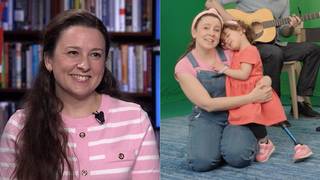
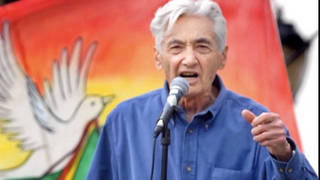
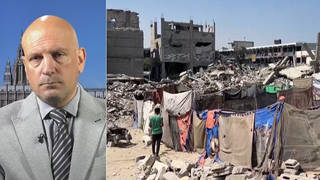
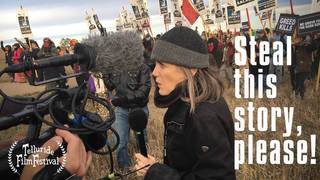





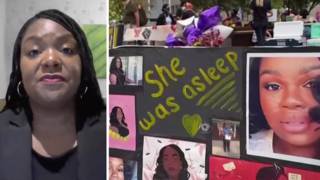
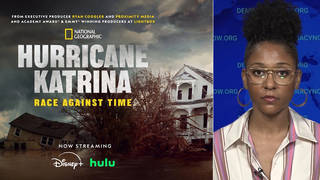
Media Options